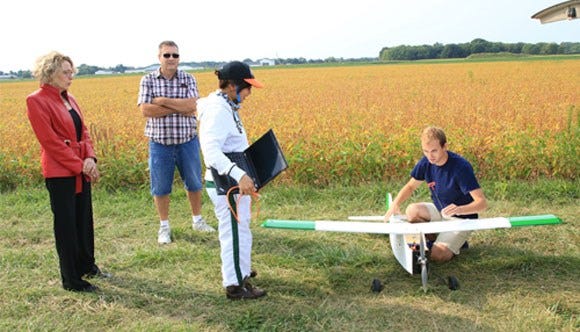New Tech Fueling $10M Ag Center
 A Purdue student prepares a UAS for flight at the university’s Agronomy Center for Research and Education.
A Purdue student prepares a UAS for flight at the university’s Agronomy Center for Research and Education.
Subscriber Benefit
As a subscriber you can listen to articles at work, in the car, or while you work out. Subscribe NowIndiana farmers are looking to stay on the front end of technology trends with help from a new Purdue University facility. The $10 million automated plant phenotyping facility will use unmanned aerial vehicles to study how genetics play into plants’ performance in the field. As first reported in our Life Sciences e-newsletter, drones will help researchers studying 1,500 acres of crops to measure the effects of characteristics ranging from plant height to the number of kernels on a single ear of corn.
Purdue says facility, which is scheduled to open this spring, will be the only research center of its kind at a U.S. university. The project is part of Purdue Moves, a series of university initiatives announced in 2013 by President Mitch Daniels. The center will part of Purdue’s Agronomy Center for Research and Education.
The school says the building will house $5 million in advanced equipment. The Indiana Soybean Alliance and Indiana Corn Marketing Council are kicking in $4 million to boost the project. That marks the organizations’ largest-ever collective investment. Chief Executive Officer Jane Ade Stevens says goals of the center include growing plants that need less water, saying "water will be a limiting factor for generations to come."
Purdue College of Agriculture Senior Associate Dean for Research and Faculty Affairs Karen Plaut says researchers currently have a weakness in "understanding how the genetic information translates to the physical information of what the plant looks like."
“If you go into a cornfield to measure the characteristics of every single plant, that’s difficult to do unless you put some automation behind it,” says Plaut. “Automation uses various tools; one of them people have heard of is UAVs that can fly across the field and take visual representations of every single plant. We also have ground equipment that can take measurements of those plants.”
Plaut, who has been an ag-related educator her entire career, says she never dreamed drones would be on the farm.
